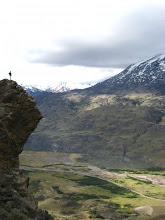Part of my reason for coming to South America was to immerse myself in not only the culture, but the language. My plan was to learn the language, and then see what doors opened. I thought about the language very nonchalantly, and I took it as something that would naturally come to fruition. Now, I have feelings reminiscent of childhood. I think it's bringing back all the repressed memories of the times where I had something to tell my parents, but just didn't know how to say it.
Learning a second language is possibly the most frustrating thing that I have ever done. There is always something that I want to say, or something someone else says to me that would be as simple as opening a door if they knew english, but not having extensive coursework in Español, it's like the door is locked, and I'm sitting there trying to pick it with my thumbs.
The first week I was here was terrible. I spent an entire time with the restoration team. I was pretty wary about going out for five days without any other english speakers, but what choice did I have? The couple of guys I was going with seemed pretty nice. We would have fairly simple conversations, only using words that were very similar to english, for example: Presidente, Barack Obama, familia, parientes, etc. The problem was that my vocabulary was very limited.
Upon arrival, we met up with some other workers that were mining rock. It was being taken from the side of a mountain to be used as siding for La Estancia's future park buildings. After we introduced ourselves, a whole new speed in conversation emerged. Words were flying from person to person like bullets, and we were in a shootout. To make it worse, they were all interested in me, and yet I could tell them nothing. The friends of mine decided to become amateur translators for me, but they wouldn't tell them the things I wanted them to. Each time we would start a new conversation, it would always begin with people asking questions of me, and my so called friends cracking jokes about me. It drove me insane. The other Chileans would just sit there and laugh while I didn't have so much as a word for them. All I could do was just take it. Later we visited a gaucho by the name of Ruiz, and he had some friends over for lunch. They were more skeptical than the rest of the Chileans I had met. These were weathered country folk that were tired of Gringos coming to their country, and had no use for them. I sat in silence, knowing that I was just another gringo. I confessed to one of my bosses that I was having a really hard time communicating. He reassured me that it would get better, but it didn't. I sat there for days in silence being laughed at, ridiculed, and left with nothing except a dumbfounded look. I finally retreated to my room in a puesto that night, and started to read a book. I figured I had enough trouble throughout the day, and that giving my mind a rest would help.
The next morning I was fresh, and ready to figure out a way to communicate. I started by telling them one simple truth: "The more you talk to me in spanish, the more I learn." So we started out with a quick overview of commonly used chilenismos, which is chilean slang. Most of them translated would naturally be vulgarisms, but to uneducated gauchos, it was a substantial part of conversation. In fact, that helped alot. When one of them would come at me with a joke, I would call them a name, and the listeners would laugh hysterically because I got them back with their own language. That became pretty fun. They would laugh, and tell everyone all the bad words they had taught me. Later, I would use them, and everyone would laugh some more. It was kind of a circus act, but it worked. I did have a little trouble getting through to Ruiz though. It was hard for him to understand my accent, and I couldn't understand his 'Patagon' at all. During any given day, we stop at puestos, and ate with the hosting gaucho. During one of these times, Ruiz came out with an accordian. He played pretty well considering he had no formal training. Finally, I asked him if I could try, and he taught me a simple accordian melody. I kept fooling around on it for a while, and eventually came up with "La Cucharacha." They were totally impressed, and went on and on about how I was better in 15 minutes than Pablo (our boss) ever was.
Since those days, it has been a slow struggle to get up to a reasonable level of communication, but I have been practicing by reading a duel language book. The only problem with the book is that it doesn't explain what situations certain words can be trouble. For example: one night I had been reading, and learned the word "duro." Duro means a number of things, but in this case hard. So, being the adventurer that I am, I was going to test out my new word. That night, they were serving left over bread at dinner from when we had been out at the puesto. When I first grabbed a piece I said, "Pan duro." All the guys at our table just looked at me, and cracked very mischievious smiles. I thought I was just describing something, but Mark knew different, and decided he was going to turn it into an insult. He told Pablo (the maker of the bread) that I said his bread was duro. Well, then Pablo turned it around, and told the head chef, Maria, that she made "pan duro" which is a huge insult to a chef, compliments of me. The entire cafeteria erupted in laughter, but I don't think Maria was too happy. I spent days trying to get back on her good side because she also cleans my room. Finally, after a rough weak in the dog house, she got me back by refusing to give me a second helping at dinner , and then confessed that she was joking and the fued was over.
Learning something new always has its ups and downs, and in most of my situations, they have been downs. But with the arrival of more volunteers, the tides have turned. Now that the english speakers have the upper hand, we will see who's laughing at the end.
Saturday, October 17, 2009
Subscribe to:
Post Comments (Atom)





I gotta introduce you to Alfredo one day.
ReplyDeleteCon el tiempo aprendiste bastante, la necesidad te hizo aprender rápido.
ReplyDeleteUn abrazo !
And.. I Know and other good history of your learning espanish. :)